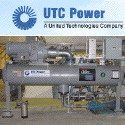Aluminum + Gallium + Water = Hydrogen, Alumina, and Gallium

From Purdue University:
A Purdue University engineer has developed a method that uses an aluminum alloy to extract hydrogen from water for running fuel cells or internal combustion engines, and the technique could be used to replace gasoline.
“I was cleaning a crucible containing liquid alloys of gallium and aluminum,” Woodall said. “When I added water to this alloy – talk about a discovery – there was a violent poof. I went to my office and worked out the reaction in a couple of hours to figure out what had happened. When aluminum atoms in the liquid alloy come into contact with water, they react, splitting the water and producing hydrogen and aluminum oxide.
“Gallium is critical because it melts at low temperature and readily dissolves aluminum, and it renders the aluminum in the solid pellets reactive with water. This was a totally surprising discovery, since it is well known that pure solid aluminum does not readily react with water.”
The waste products are gallium and aluminum oxide, also called alumina. Combusting hydrogen in an engine produces only water as waste.
Clearly this is a research project, not a commercial technology. But one has to wonder what the commercial applications for such a process are. Hydrogen is a great fuel if it can be produced sustainably and stored safely. We’ll monitor this work as it develops.









How pure does the water have to be? Can sea water be used? What about a coastal power plant that produced electricty and desalinated water?
How much electricity does it take to process aluminum from ore??? Lots! That’s why Alcoa has a gigantic power plant on site!
How much energy will it take to add Gallium???
Think about it folks — Conservation of Energy…
The whole point is that the aluminum alloy could be mixed with water to produce hydrogen on site (your car for example), so this eliminates having to transport and store hydrogen. And the alumina can be recycled back into aluminum and the gallium isn’t used at all.
Conservation of Energy? How is this not better than using fossil fuels? Obviously, this won’t work if you use fossil fuels to recycle the aluminum, but if you use nuclear, wind or solar it could work. And hydrogen fuel cells are way more efficient than combustion engines
how do you recover the gallium from the reaction after releasing the hydrogen? thank you.